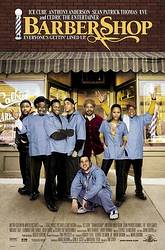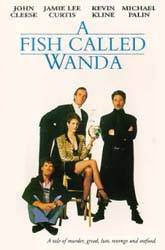 Director: Starring:
OTHER REVIEWS: Chocolat The Man
Who Wasn't There The
Original Kings of Comedy Small
Time Crooks |
Barbershop BY: DAVID PERRY With the exodus of the white population from the inner-city, various traditions have been extinguished out of a WalMart level of competition in the suburbs. A recent report on one of these lost traditions recently aired on CNN, where the question was asked, "what has happened to all the barbershops?" Though recently shown in lurid detail in The Coen brothers' The Man Who Wasn't There, the profession has dissipated to little more than an icon of the bygone 1950s. By the time I moved to a small town, the place where they are supposed to continue to flourish, in 1990, those twisting stripe signs were nowhere to be found. And yet the barbershop has not completely left the face of the earth: within the small enclaves of the inner-city these tiny shops still serve as a meeting ground for the men of the neighborhood. As one character in the new film Barbershop puts it, the barbershop has historically been the black country clubs, the place where they can relax and chat about the day-to-day life. In most white neighborhoods, losing barbershops means going somewhere else to get a haircut; in these black neighborhoods, losing them means losing a way of life. This fact does not stop Calvin (Ice Cube), the protagonist of Barbershop, from feeling the strain of trying to run one. Having gotten the shop from his father, a business owner with little interest in keeping up store finances, Calvin sees no choice but to close down the place so that he can pursue his own dream (starting a music studio). Business does not seem horrible, it's just that the place has too many debts caused partly by a slew of staff members. And what a varied collection of practitioners these people are. Jimmy (Thomas) is a college student trying to constantly prove his knowledge to the rest of the crew; Ricky (Ealy) is an ex-convict trying to prove himself on the workforce; Terri (Eve) is the odd-woman-out with a philandering boyfriend; Dinka (Howze) is a Nigerian immigrant with eyes for Terri; Isaac (Garity) is a white guy trying to show himself to be as black as everyone else; and Eddie (Cedric the Entertainer) is the longtime employee constantly telling the kids why their generation is wrong about everything from life to black figures. All these people are dependent on Calvin's barbershop (though Eddie seems to see it as more a place to go than as a place to work -- he never seems to have any customers) and yet Calvin has just sold the place to lowlife businessman Lester (David). There was a compromising point between the two: for $20,000, Lester could have the place as long it remains "the barbershop." Lester, smilingly, makes the deal and begins planning the opening of his nightclub called "The Barbershop." The film takes place during a twenty-four hour period in which Calvin must find a way to get the shop back from Lester before officially closing the place. It is not necessarily a story that is new by any means, but screenwriters Mark Brown, Don D. Scott, and Marshall Todd inject it with enough love for the barbershop milieu that it becomes impossible to not feel some fear that Calvin will not succeed. It is not as much a fear that we he and the gang will be without jobs, but a fear that another reminder of our past is about to be destroyed. Eddie, the curmudgeon elder, is always around to allow the film to gently repeat the impact of closing a single barbershop in a world littered with SuperCuts. This is not to say that Barbershop is a wholly
commanding work. In fact, a couple of its subplots, including a botched ATM robbery by two
hoods, feel so forced that their presence damages the impact of the main story. Most of
the characters are strong enough to carry a movie on their own, so allowing them to grow
within this story would have been sufficient in establishing the film as a winsome and
enjoyable little film. However, the screenwriters and director Tim Story haven't the
gumption to rely on these sounder elements, instead reverting to moments that are more
akin to Friday than a smart look at the mortality of our past. |




